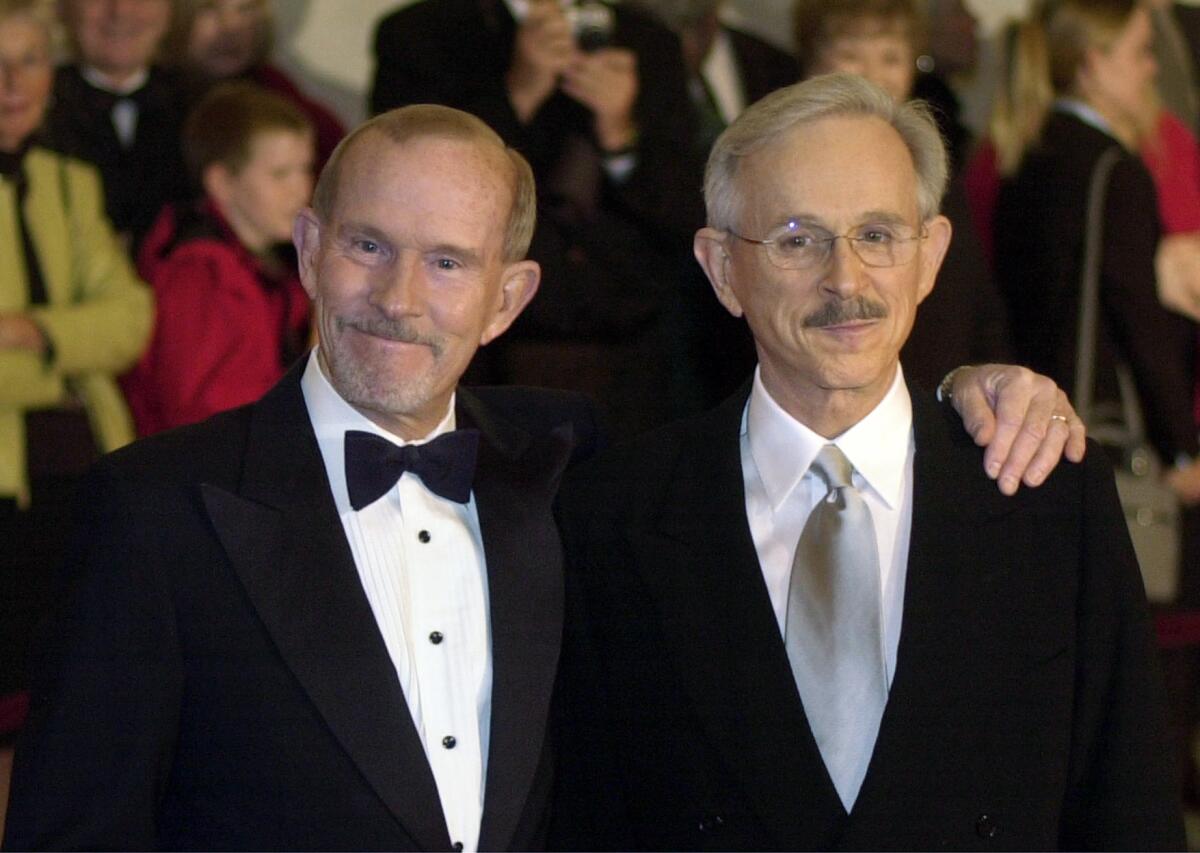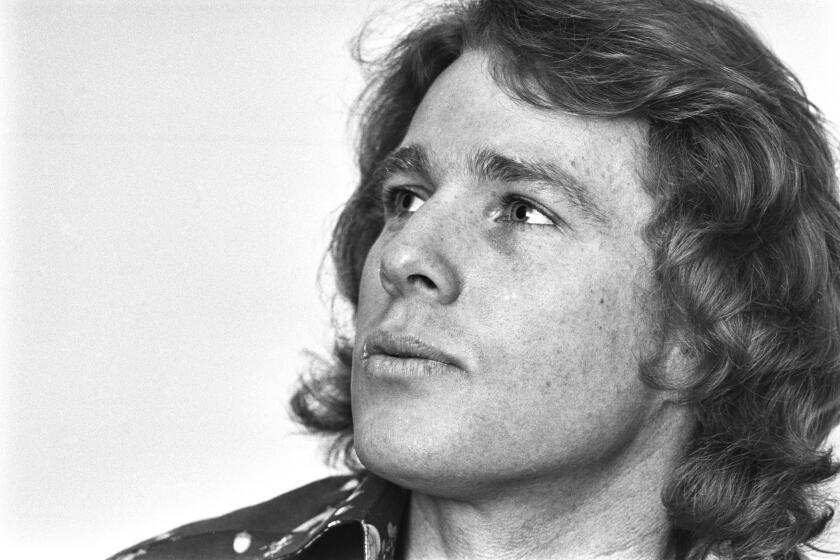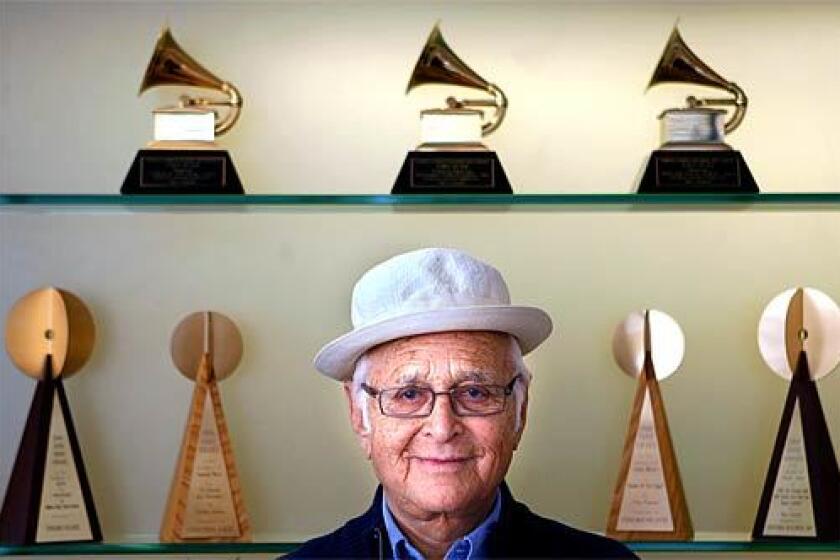Tom Smothers, who co-starred in legendary ‘Smothers Brothers Comedy Hour,’ dies at 86

- Share via
Tom Smothers, one-half of the iconic and subversive 1960s comedy duo the Smothers Brothers, has died. He was 86.
The Emmy Award winner died Tuesday after a recent battle with cancer, his family said in a statement released Wednesday by the National Comedy Center.
For the record:
11:56 a.m. Jan. 4, 2024A previous version of this story gave the title of a Pete Seeger song as “Knee Deep in the Big Muddy.” It is “Waist Deep in the Big Muddy.”
10:26 a.m. Dec. 28, 2023A previous version of this story said that Tom Smothers’ father was in the Navy. He was in the Army.
His brother, Dick Smothers, who co-starred with him in the groundbreaking “The Smothers Brothers Comedy Hour,” said Tom was at home in Santa Rosa, Calif., with his family when he died.
“Tom was not only the loving older brother that everyone would want in their life, he was a one-of-a-kind creative partner,” Dick Smothers said in the statement. “I am forever grateful to have spent a lifetime together with him, on and off stage, for over 60 years. Our relationship was like a good marriage — the longer we were together, the more we loved and respected one another. We were truly blessed.”
The pioneering comedy duo came to national prominence in the 1960s when their variety series — alongside “Rowan & Martin’s Laugh-In” — turned television into an influential countercultural tool, opening a window onto “the absurdities and hypocrisies of the adult world and its institutions,” The Times’ television critic Robert Lloyd wrote in 2018. They questioned authority with laughter and challenged power with humor and satire, the Hollywood Reporter said.
The year 1968, as I remember it, had the quality of lasting longer than other years, of being in no hurry to be through with you, like a predator playing with its prey before swallowing it whole.
Tom — a naive-appearing comic genius — was 30 and the musically inclined Dick was still in his 20s when the show premiered. They became household names through their Sunday night program, which ran on CBS from 1967 to 1969, ultimately going off the air amid controversy. In it, they showcased a healthy sibling rivalry along with an arsenal of characterizations and slapstick sketches that filled one of the most appealing hours of variety show programming in the late ’60s. They immediately endeared themselves to young baby boomers.
The musical comedy team famously satirized politics, took on racism, occasionally invited controversial guests and made pointed references to drugs, the draft and presidential politics. With that, they paved the way for “Saturday Night Live,” “The Daily Show” and the current slate of late-night TV, according to Journey Gunderson, executive director of the National Comedy Center. The series also launched the careers of Rob Reiner, Bob Einstein, Carl Gottlieb and Steve Martin, among others.
The left-leaning siblings directly took on the Vietnam War, with Tom at one point calling on air for troops to return to the U.S. and landing on then-President Nixon’s list of enemies. Early in their second season, the brothers clashed with CBS over cutting an antiwar song sung by guest Pete Seeger, “Waist Deep in the Big Muddy.” Such conflicts would occur regularly enough that the network began demanding to see finished episodes far in advance, and the brothers repeatedly faced the ire of network censors.
“We were just at the scene of an accident, when America was searching for meaning,” Tom Smothers told The Times in 1988. “We were just directing traffic.”
After the show’s cancellation, the irreverent siblings sued the network for $31 million and were awarded $775,000 — a battle that was the subject of Maureen Muldaur’s 2002 documentary, “Smothered: The Censorship Struggles of the Smothers Brothers Comedy Hour.”
It hardly seems possible that TV entertainers whose repertoire included asking Mr.
Although the series was nominated for two Primetime Emmy Awards, Smothers received only one golden statuette, long after the show went off the air. In 2008, the Television Academy gave him an honorary Emmy for his writing contributions on “The Smothers Brothers Comedy Hour” after he had opted to remove his name from the ballot during the 1969 Emmys to avoid controversy, Variety reported. Upon accepting the award from co-star Martin, the wise-cracking scribe thanked the writers whom he said got him fired and dedicated the award to his fearless compatriots.
“It’s hard for me to stay silent when I keep hearing that peace is only attainable through war,” Smothers said in the speech, dedicating the prize to those “who feel compelled to speak out and are not afraid to speak to power and won’t shut up and refuse to be silenced.”
In 2010, he and Dick were inducted into the Television Academy Hall of Fame.
Ryan O’Neal, who starred in ‘Love Story’ and ‘Paper Moon,’ cementing his status as a heartthrob in the ‘70s, died Friday. He was 82.
Thomas Bolyn Smothers III was born Feb. 2, 1937, on Governors Island in New York Harbor. His father was in the Army and was stationed there until being transferred to the Philippines in 1940 — with wife, two sons and baby girl in tow. They lived there until the Japanese bombed Pearl Harbor in December 1941. Major Smothers stayed behind and died in a Japanese POW camp during World War II, according to the Associated Press. The family eventually relocated to the seaside suburb of Redondo Beach, where the up-and-coming comedian helped his mom take care of his younger siblings.
Both he and his brother attended Redondo Union High School, where he was an active athlete who competed in gymnastics and track and was known to be a class clown, the Daily Breeze reported. After graduating in 1955, he enrolled at San José State College, now known as San José State University.
With a knack for showmanship, Tom and his brother would put on folk performances at a young age and incorporated their developing, offbeat humor. They performed in nightclubs and on the college circuit and recorded their first comedy album, “The Smothers Brothers Live at the Purple Onion,” in 1961. Its success eventually led to appearances on “The Tonight Show” with Jack Paar, “The Garry Moore Show” and “The New Steve Allen Show.”
Tom would take the stage with a guitar and Dick — the straight man — would carry an upright bass, performing folk songs that would ultimately give way to a staged error on Tom’s part and humorous tiffs that laid the foundation for their series.
The multiple Emmy-Award-winning writer-producer and liberal political activist revolutionized prime-time television in the 1970s with groundbreaking, socially relevant situation comedies such as ‘All in the Family,’ ‘Maude’ and ‘The Jeffersons.’ He was 101.
“Tom Smothers was not only an extraordinary comedic talent, who, together with his brother, Dick, became the most enduring comedy duo in history, entertaining the world for over six decades — but was a true champion for freedom of speech, harnessing the power of comedy to push boundaries and our political consciousness,” Gunderson said. “Tom was a true pioneer who changed the face of television and transformed our culture with ‘The Smothers Brothers Comedy Hour.’”
Smothers is survived by his third wife, Marcy Carriker Smothers, children Bo and Riley Rose Smothers, grandson Phoenix, sister-in-law Marie Smothers, several nephews and a niece. His son Tom and sister Sherry Smothers predeceased him.
The family has requested that memorial donations honoring Smothers be made to the National Comedy Center, the cultural institution that has preserved and showcases the Smothers Brothers’ career and legacy.
More to Read
The complete guide to home viewing
Get Screen Gab for everything about the TV shows and streaming movies everyone’s talking about.
You may occasionally receive promotional content from the Los Angeles Times.









